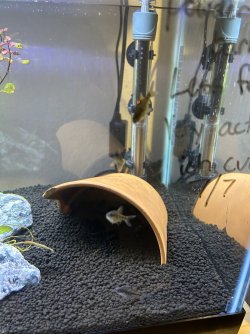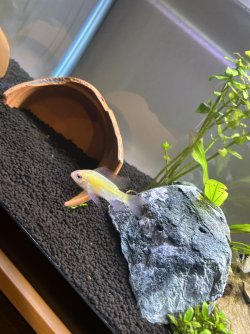Epistylis is not as common as it's made out to be by certain people online. It is an opportunistic parasite, unlike ich. Epistylis lives freely in the environment, with no host. It only attaches to other animals if that animal is weakened by a primary bacterial or fungal infection, especially if that infection is external. Ich, on the other hand, is an obligate parasite. It cannot exist without a host, so the fish can be perfectly healthy otherwise and still get ich.The betta was also previously with wood which I believe did not help with the fins you can see that the wood has been removed. I have been keeping them in the cleanest water I can without over doing it. He has been absolutely fine before the guppies were added and both of the tanks got ich after the fish from the store were added and I know all the tanks in the store are connected to one sump. So far all fish are eating and betta still has enough energy to chase guppies. All invertebrates were removed when I added the ich meds. I don’t think betta boy had fin rot but I will start watching much more carefully though I has seen some improvement in the fins over the month. I currently don’t have enough quarantine tanks for all the fish that could be infected which is why they are being dosed in their tanks. All the current infection has happened in the past 3 or so days which is why I was surprised to see my betta had so many white spots already. I have ordered some meds to mix in with their food in case it is not ich but instead epistlis because last time my fish had “ich” it was actually epistilis but I am hoping this is ich. All fish showed signs of being hungry but were not fed and I found a couple scratching against items in the tank thank you all for the input by the way! All the tanks got one more tablespoon of salt today in hopes to slowly increase but I might keep it at this level for awhile.
I can tell you with near-certainty that what your fish have is ich. Personally, I would not bother using the medicated food unless the ich meds don't work for some reason.
I doubt the wood had anything to do with your bettas fins. If it was a very rough or sharp piece of wood, it might tear long fins. However, your betta's fins do not look torn. They look melted away by fin rot. It's extremely common in pet store "rescue" bettas. If you bought the betta looking that way, then the fin rot is not your fault by any means, and I'm glad you've seen some minor improvement, but it is now your responsibility to properly address it and treat it. That's the danger with "rescuing" bettas from pet stores. It feels nice to give them good homes, but they often come riddled with diseases which may or may not be treatable. It's always a gamble.



